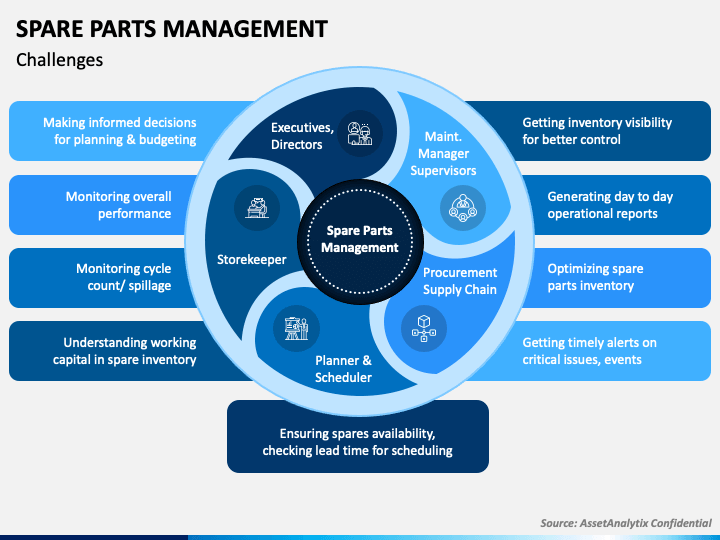
The Benefits of Spare Parts Management- Reasons Why It Is Important
Spare parts management refers to managers ensuring that the correct parts are delivered to workers quickly, accurately, and efficiently. Your business may experience unforeseen expenses and unnecessary downtime due to inadequate spare parts control and planning resulting in insufficient spare parts and inefficient inventory storage. Focusing time and resources on spare parts management is worthwhile Because you can prevent problems before they occur. So no matter what type of industrial equipment you have, proper spare parts management is necessary for the smooth running of business operations.
Related Post: What is Spare Parts Management
Benefits of Spare Parts Management

Avoid Unneeded Expenses
While buying spare parts can mean spending extra money in the first place, experiencing equipment failure will result in lost efficiency, equipment downtime, and expensive repairs. This usually happens when spare parts inventory levels are just below the appropriate level.
Therefore, if the necessary spare parts are on hand, downtime is minimized because the spare parts are already on hand. At the same time, building an effective spare parts management and planning system, will help businesses free up capital and reduce existing inventory while maintaining a high level of accessibility and service.
Control And Perform Proper Repairs
You may have received duplicate invalid spare parts that were of no use when replacing parts. At the same time, there may also be emergency repairs to prevent major downtime or breakdowns.
Both of these situations can actually lead to more expensive damage to your equipment, especially if you decide to manage the repair yourself.
Therefore, in order to avoid this situation, first of all, you must establish an effective spare parts management system. Doing this also ensures that the right repairs are done at the right time. However, to ensure a smooth repair or replacement, you should also hire a trusted engineer to properly execute the process.
Reduces Inventory Costs
Failure to properly manage spares can result in an excess of spares that can lead to exorbitant storage costs. Not only are there storage costs, but holding too many parts can also lead to shipping costs. Effective spare parts management ensures that critical spare parts are available when needed without maintaining too much inventory to avoid unnecessary storage and transportation costs. Failure to properly manage spares can result in an excess of spares that can lead to exorbitant storage costs. Not only are there storage costs, but holding too many parts can also lead to shipping costs. Effective spare parts management ensures that critical spare parts are available when needed without maintaining too much inventory to avoid unnecessary storage and transportation costs.
Provide Better Customer Service
Equipment downtime, especially critical equipment that powers the rest of the machine, can have a huge negative impact on your business.
Therefore, spare parts management is very important as it will help ensure operations in a more efficient manner. In other words, it means having the right part at the right place and time. With the right spare parts on hand, your business can continue to operate even after a major equipment failure, avoiding the loss of critical time and profits while waiting for the right spare to be delivered.
Therefore, you may need to contact your trusted engineer for some generator or motor spare parts, depending on which equipment is missing spare parts in stock.
Improved Productivity
Having parts readily available to repair teams to repair or maintain assets means that work orders can be completed quickly and efficiently. Poor spare parts management inevitably leads to reduced productivity. Additionally, having critical spare parts reduces downtime and repairs equipment faster. Even a single machine failure on the line can bring the entire process to a halt, so it is critical to reduce downtime by delivering the right parts.
Reduction of Obsolete and Duplicate Materials in your EAM/CMMS System
Ineffective spare parts management can lead to material obsolescence and duplication in EAM/CMMS solutions. When critical equipment needs repair or maintenance, proactively managing the process of dealing with obsolete spare parts, especially critical equipment, can avoid problems. Adding the same material multiple times to an EAM/CMMS solution is costly and wastes time for maintenance and procurement teams. It also makes it difficult to select parts and plan work in the system.
Reduced Downtime
The most obvious benefit of managing spare parts at the factory is the ability to repair them faster. Since the parts you need are already available, you can minimize repair time. This applies to internal resources you have, who may be able to perform repairs in-house, or external engineers, who don’t need to look for replacement parts before visiting your facility.
By creating the conditions for faster repairs, you can reduce production line downtime. In some cases, a broken machine can bring production to a standstill, costing you and your employees valuable time. With manufacturers reportedly losing as much as £180bn a year to unplanned downtime, businesses must do everything they can to avoid downtime.
Prevent Interruptions Due To Ordering Wrong Parts
Effective spare parts management should also allow you to prevent interruptions when the wrong spare parts are ordered. For example, if a part is misclassified or poorly described, there is a greater chance of selecting the wrong part when planning a job. Delayed repairs and maintenance can cause delays in the production process, which can be avoided by accurately describing the material.
Monitor Issues In Line
The act of spare parts management means adjusting the inventory according to the needs of the machine. This is required so that there is always at least one replacement part for any potential failure that may occur. However, over time, this can also help you identify problems in your production line.
If you notice that due to frequent replacements, you have to order the same parts over and over again, which begs the question: why is this machine in constant need of service. While different parts will naturally have different lifespans, they should last relatively long if genuine parts are used.
By monitoring the parts you order, and what parts are being used, you can establish patterns in the factory. These can highlight problems in your product line. For example, if a machine is misused – for the wrong type of product or incompatible equipment, it can increase strain and damage, increasing the need for frequent repairs.
Using this data will allow you to improve your production line, ensuring you have the right parts for your needs, trained staff who know how to operate the line, and adequate integration between equipment. If there is a problem, it guides you to the top cause and empowers you to find an appropriate solution. This will lead to better production lines offering high-standard products.
Summary
Implementing effective spare parts management is very beneficial for every plant. When it comes to reducing costs, improving quality, and creating an efficient, smooth operating environment for your operations, the potential rewards are undeniable.
It even helps you optimize production on a larger scale, eliminate problems, and enjoy better results.
We have simplified the spare parts management process. With thousands of parts in stock at any given time and fast shipping, we can quickly deliver the parts you need. Our parts are also original, guaranteed to be compatible with your machine, and backed by our warranty.


Average Rating